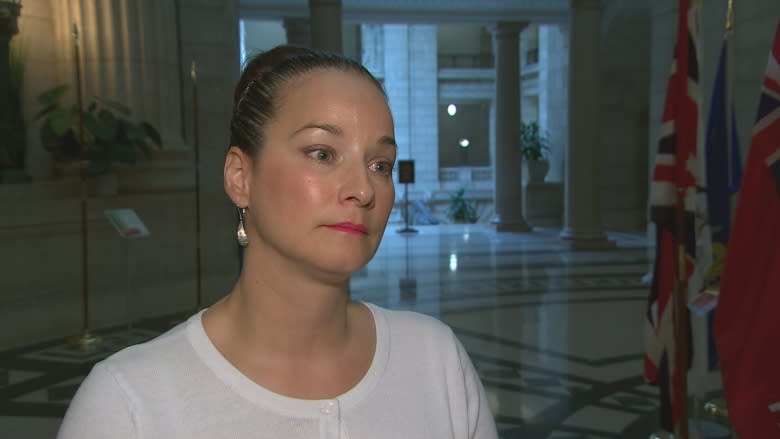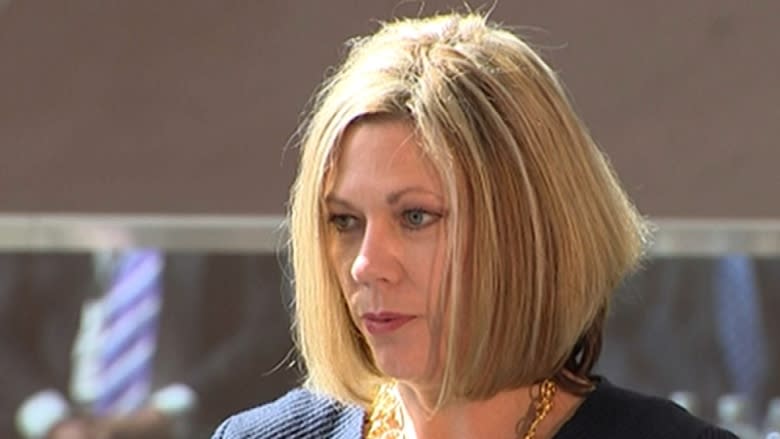Hillary Clinton's historic win highlights gender gap in Manitoba politics
Hillary Clinton's Democratic presidential nomination represents a historic moment for the U.S., but the big win also highlights a shortage of women in politics in Manitoba.
After securing the nomination Tuesday, Clinton said Democrats "just put the biggest crack in that glass ceiling."
Canada is making strides in the gender parity department, too. Justin Trudeau introduced the first gender-balanced cabinet in Canadian history last fall.
But while it may be 2016, only one-quarter of all members of Parliament are women — a historic high but still a far cry from gender parity.
On the provincial level, Manitoba has also made progress in recent years, but the historic gender representation breakdown isn't anything to be proud of, St. Johns NDP MLA Nahanni Fontaine said.
Only 60 women have been elected to the Manitoba Legislature since its inception, compared to about 800 men, said Rochelle Squires, the minister responsible for status of women. That disparity speaks to the uphill battle Manitoba women in politics still face, she added.
Newfoundland and Labrador, Prince Edward Island, Quebec, Ontario, Alberta, B.C., Nunavut and Yukon have all had female premiers, but Manitoba has not.
Portage-Lisgar MP Candice Bergen said Clinton's achievement is remarkable in many ways and should signal to Canadian girls and women that they are cut out for life in politics.
"I believe women are more political and politically minded than they many times give themselves credit for," Bergen said. "Women are stronger than they believe many times. Women are willing to take more risks than they sometimes can imagine, and you have to be able to do those things to be in politics."
But Bergen said she feels young women voters today place more weight on the values and overall quality of a political candidate than on their gender.
"I think that what's happened, and it's a good thing, is that people are more and more excited by ideas and the person, and the gender is definitely something that people can celebrate, but it's not the determining factor," she said.
"I don't think women should think because they're a woman that they somehow will encapsulate so-called 'women's issues.' I don't like to be put in a box and be told I should be supporting somebody running just because they're a woman. I want to be measured on what I believe, on my merits, on my integrity, on what I stand for.… Women don't want to be the token woman."
Fontaine said she agrees Clinton's win should be celebrated, but she disagrees with Bergen about how central the role of gender is in politics.
"I would disagree that it's only about ideas. The fact that Hillary has secured that nomination and will be running for that is a reflection of maybe something that she brings different and something that will have a historical and fundamental impact on women in the States, in Canada and of course across the globe," Fontaine said.
"They can now see themselves pursuing that path and they see themselves reflected in that most powerful position."
Women of colour 'doubly disadvantaged'
Squires said Clinton's win was also a significant step forward for women in leadership positions, particularly women in politics.
"This is certainly no time for women to rest on their laurels and to think that the work is done," Squires said.
Fontaine said she has personally felt disadvantaged in her career because of her gender, something she describes as "par for the course." Women continue to face barriers, and it's clear there is an even deeper force keeping women of colour from seeking public office, Fontaine said.
The election of Amanda Lathlin, NDP MLA for The Pas, in April 2015, marked the first time an Indigenous woman became a member of the Manitoba Legislative Assembly, and Fontaine's win is the first time an urban Indigenous woman has been elected as an MLA, she said.
"I think that's something we have to be very cognizant of, that even among women, there are disparities, there are racial constructions and there are realities and obstacles that non-Indigenous women don't face," Fontaine said. "For Indigenous women and racialized women, we are doubly disadvantaged."
Bergen agreed that striving for greater gender equality in politics is a noble goal but said "we've got to be careful in terms of exact parity."
"There are many professions where there is not gender parity, whether it's teaching, whether it's nursing, whether it's military. That's changing," she said. "This isn't an exact science. I think it's more, again, about empowering people to enter public office and follow what they believe."
Squires said there's more acceptance of women in leadership roles now. The narrative of women in leadership roles as "bossy or too aggressive" seems to be waning, she said, but more needs to be done to recognize and respect the voices of female politicians.
Fontaine said in the age of social media, she believes some forms of misogyny are possibly getting worse, as just about anyone with a Twitter or Facebook account can hurl racist or sexist comments at women in public office anonymously.
"I can tell you first-hand, and I can tell you from a myriad of other women that I know that face just vitriolic misogyny on social media," Fontaine said, adding she has received threatening messages since she took office.
"I had an email from someone saying that I was too loud and was bellowing, and that as a female I should lower my voice.… Whether or not it exists equally for women, for all women who are elected, I would argue that in many respects racialized and Indigenous women are going to face a little bit more of that because of the undertones of racism that we have in our province and in our country."
Bergen, Squires and Fontaine all agreed that Clinton's win will attract more women to politics.



